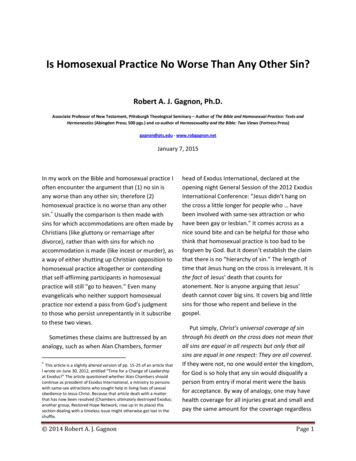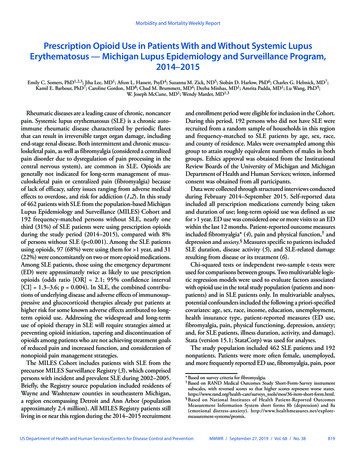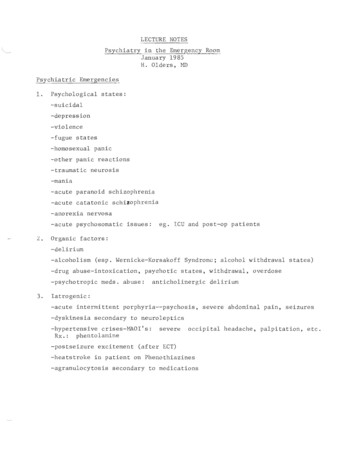
Transcription
Is Homosexual Practice No Worse Than Any Other Sin?Robert A. J. Gagnon, Ph.D.Associate Professor of New Testament, Pittsburgh Theological Seminary – Author of The Bible and Homosexual Practice: Texts andHermeneutics (Abingdon Press; 500 pgs.) and co-author of Homosexuality and the Bible: Two Views (Fortress Press)gagnon@pts.edu - www.robgagnon.netJanuary 7, 2015In my work on the Bible and homosexual practice Ioften encounter the argument that (1) no sin isany worse than any other sin; therefore (2)homosexual practice is no worse than any othersin. Usually the comparison is then made withsins for which accommodations are often made byChristians (like gluttony or remarriage afterdivorce), rather than with sins for which noaccommodation is made (like incest or murder), asa way of either shutting up Christian opposition tohomosexual practice altogether or contendingthat self-affirming participants in homosexualpractice will still “go to heaven.” Even manyevangelicals who neither support homosexualpractice nor extend a pass from God’s judgmentto those who persist unrepentantly in it subscribeto these two views.Sometimes these claims are buttressed by ananalogy, such as when Alan Chambers, former This article is a slightly altered version of pp. 15-25 of an article thatI wrote on June 30, 2012, entitled “Time for a Change of Leadershipat Exodus?” The article questioned whether Alan Chambers shouldcontinue as president of Exodus International, a ministry to personswith same-sex attractions who sought help in living lives of sexualobedience to Jesus Christ. Because that article dealt with a matterthat has now been resolved (Chambers ultimately destroyed Exodus;another group, Restored Hope Network, rose up in its place) thissection dealing with a timeless issue might otherwise get lost in theshuffle. 2014 Robert A. J. Gagnonhead of Exodus International, declared at theopening night General Session of the 2012 ExodusInternational Conference: “Jesus didn’t hang onthe cross a little longer for people who havebeen involved with same-sex attraction or whohave been gay or lesbian.” It comes across as anice sound bite and can be helpful for those whothink that homosexual practice is too bad to beforgiven by God. But it doesn’t establish the claimthat there is no “hierarchy of sin.” The length oftime that Jesus hung on the cross is irrelevant. It isthe fact of Jesus’ death that counts foratonement. Nor is anyone arguing that Jesus’death cannot cover big sins. It covers big and littlesins for those who repent and believe in thegospel.Put simply, Christ’s universal coverage of sinthrough his death on the cross does not mean thatall sins are equal in all respects but only that allsins are equal in one respect: They are all covered.If they were not, no one would enter the kingdom,for God is so holy that any sin would disqualify aperson from entry if moral merit were the basisfor acceptance. By way of analogy, one may havehealth coverage for all injuries great and small andpay the same amount for the coverage regardlessPage 1
of the injury; but that doesn’t mean that allinjuries are of equal severity. As we shall see,there is a mountain of evidence from Scripture (inaddition to reason and experience) that shows (1)sins do differ in significance to God and (2) Godregards homosexual practice as a particularlysevere sexual sin.Why an Egalitarian View of Sin?Why, then, do so many insist on an ‘egalitarianview of sin’? There may be several reasonsworking together.First, many Christians are overeager to dowhatever they can to soften criticisms fromhomosexualist advocates. The latter, many ofwhom are very good at being outraged atanything that disagrees with their agenda, gobonkers when they hear homosexual practicedescribed as a severe sin.Second, some are pushing an egalitarian viewof sin at least in part out of pastoral concerns, soas not to turn off homosexual inquirers with amessage that they might find hard to accept. Theflipside of this is that they may want a theologicalbasis for criticizing any sense of self-superiority oruncharitable spirit coming from the church. Somebelieve that the church is responsible for creatingan angry and bitter “gay-rights” community bygiving a pass to Christians involved in heterosexualsins while using the Bible to beat up on personswho engage in homosexual behavior.There is some truth in this view. However, theidea that, if the church had just delivered themessage on homosexual practice as sin with morelove and more balance, there wouldn’t be anyexpression of anger and bitterness from the gayrights community is preposterous. Jesus was a 2014 Robert A. J. Gagnonloving guy and yet he was crucified for speakingthe truth. Sin hates any restraint of its power andthose under the controlling influence of same-sexattractions are no different. In addition,expressions of outrage and efforts at intimidationare an integral part of the homosexualist strategyfor coercing societal approval of homosexualpractice.Christians should take care that in their rush toappease homosexualist advocates they don’t endup denying Scripture itself, which doescharacterize homosexual practice in very negativeterms, not as the only sin to be sure butnonetheless as a grave offense. One wonderswhether Christians who denounce other Christiansfor saying that homosexual practice is a severe sindeep down think that the Apostle Paul is a bigotfor giving special attention to homosexual practicein Romans 1:18-32 as a particularly self-degrading,shameful, and unnatural practice that is in part itsown “payback” for those who engage in it.While I have some sympathy for a pastoralmotivation to stress more the element ofuniversal sin to inquirers who might otherwisehave anti-Christian prejudices activated, I cannotaccept a blatant falsification of the Bible inclaiming that the church, in viewing some sins (likehomosexual practice) as worse than other sins,has created a tremendously damaging view thatthe Bible itself does not substantiate. I shall showbelow that both the general view that some sin ismore heinous to God than others and the specificview that homosexual practice is a particularlysevere sexual offense in God’s eyes (in seriousnesssomewhere between adult-consensual incest andbestiality) are well documented from Scripture.Parenthetically, if people are really serious aboutthe view that no one sin is worse than any other,they shouldn’t be upset by the comparison toPage 2
consensual incest (since by their own reasoningincest is no worse than any other sin).What a Hierarchical View of Sins Oughtand Ought Not DoLet it be understood what the biblical view ofsome sin as worse than others does not entitleanyone to do:1. Deny one’s own sinfulness apart from Godand need for Christ’s atonement.2. Excuse one’s own sin.3. Treat others in a hateful manner or wishfor them that they not come torepentance (in the manner of Jonah’sinitial view toward the Ninevites).4. View anyone as immoral or spirituallyinferior simply for the mere experience ofurges to do what God strongly forbids.On points 1 and 2, Paul believed both (1) thatsome sin is worse than others (idolatry and sexualimmorality were major concerns, for example; andwithin the category of sexual immorality, he hadparticular revulsion for homosexual practice, then(adult) incest, then adultery and sex withprostitutes; Rom 1:24-27; 1 Cor 5; 6:9, 15-17; 1Thess 4:6); and (2) that “all have sinned and fallshort of in God’s glory” and can only be maderight by God’s grace through Christ’s redeemingwork (Rom 3:23-25). The two points are not inopposition or even in tension. The fact that all sinis equal in one respect—any one sin can disqualifyone from the kingdom of God if one doesn’treceive Christ—does not infer that all sin is equalin all respects—some sins provoke God to bringjudgment upon his people more than others.With respect to the third point, recognizing thespecial severity of homosexual practice should in 2014 Robert A. J. Gagnonno way lessen the pastoral love and care shown topersons acting out of same-sex attractions. On thecontrary: The greater the severity of sin, thegreater the outreach of love. This is the lessonthat we learn from Jesus’ outreach to taxcollectors and sexual sinners. There is a tendencyin the church, on both sides of the theologicalaisle, to correlate severity of offense with lack oflove. So the liberal argues that in order to lovesomeone we have to reduce the severity of theoffense that the offender engages in or eliminatethe offense altogether. The conservativesometimes maintains the severity of the offenseat the cost of exercising love to the offender. Jesus(and Paul) taught us to uphold love and anintensified sexual ethic at the same time. Hedidn’t have to lower the gravity of the offense ofexploitative tax collectors in order to love them.Rather, because their offense was so grave (i.e.,putting others at risk of starvation by collectingmore in taxation than they were assigned tocollect and profiting thereby), he devoted agreater proportion of his ministry outreach tothem. The inverse relationship between theseverity of the offense and the outreach of love(the greater the offense, the lesser the lovingoutreach; the greater the loving outreach, thelesser the offense) is pure paganism that we mustdrop from the church altogether.Regarding the fourth point, no one is at faultmerely for experiencing urges that one does notask to experience and does not seek to cultivate.For example, the fact that someone experiencessame-sex attractions at all is not something forwhich one is morally culpable and does not in anyway justify a designation of the person as morallydepraved. Same-sex erotic desires, like any desiresto do what God expressly forbids, are sinfuldesires (i.e., they are desires to sin), which is whythe one experiencing the desires should not yieldto them either in one’s conscious thought-life or inPage 3
one’s behavior. Feelings of jealousy, covetousness,greed, pride, or sexual arousal for an illicit unionare all sinful desires; but one isn’t culpable forthem unless one willingly entertains them in one’smind or acts on them in one’s behavior.Here is what the biblical view of differentseverity of sins does entitle one to do:1. Use it to gauge the extent of another’smovement away from God’s grace andthus the level of intervention needed.2. Deny that societal or ecclesiasticalaccommodations to some sins (likedivorce and remarriage after divorce)justify accommodations to greater sins(adultery, incest, homosexual practice,pedophilia, bestiality). People can logicallymove only from greater to lesser offenses,not lesser to greater offenses.God has given us all a sense of right and wrongwith our consciences. We rightly have a sense thatsome actions are more evil than others and codifythat sense in our laws, however imperfectly.Granted, even our consciences have been affectedby the corrupting influence of sin, and nowheremore so than when we excuse our own sin.Moreover, our relative ordering of sins can beskewed by our own sinful desires. However, theprinciple that some sins are more heinous thanothers, not just in their effects on humans but alsoin the estimation of God, is God-given. If we didn’thave that sense within our moral compass, societywould be far more perverse than it already is.Logic, Experience, and the GreatChristian TraditionsSurely all reasonable persons are bound toacknowledge that for a woman’s husband to tell 2014 Robert A. J. Gagnonher a “white lie” about spending 50 rather than 25 on a new watch is not as bad as if he hadcommitted adultery against her with five otherpeople. Surely reasonable people must admit thatin God’s eyes (and not just ours or the victim’s) itis worse for a parent to rape a child than for aparent to scold a child a little more than isnecessary for an offense.Nobody actually lives in the belief that all sinsare equally severe on a moral plane. Indeed, oftenit is those who argue in connection withhomosexual practice that all sin is equal that getparticularly upset if one compares homosexualunions to (adult) incest, bestiality, or pedophilia.They do so precisely because they regard incest,bestiality, and pedophilia as “really bad” and don’twant homosexual behavior to be associated withthem. Such a reaction, however, is already aconcession to the obvious principle that some sinsare worse than others. Not a day goes by thatpeople don’t regularly assess some actions asgreater wrongs than others. In my household if myyoungest child goes to bed but sneaks in a littleflashlight to do so reading or drawing beyond anyreasonable bedtime and against her parents’wishes, she has done wrong but in a relativelylight way as compared to, say, hitting her sibling.Not only is the belief that all sins are equal toGod in all respects manifestly absurd to humanlogic and experience, but also the great Christiantraditions are agreed that some sin is worse thanothers. This is recognized even within theReformed tradition, which emphasizes (rightly)universal human depravity (note: I am an ordainedelder of the Presbyterian Church USA). Forexample, the Presbyterian Larger Catechism of theWestminster Confession of Faith (1647) states:“All transgressions of the law of God are notequally heinous; but some sins in themselves, andby reason of several aggravations, are morePage 4
heinous in the sight of God than others” (7.260,my emphasis; elaboration in 7.261; cf. the ShorterCatechism 7.083).Not only is this a Protestant view, it is also aCatholic view (note the difference between venialand mortal sins, as well as differentiations ofgravity within the category of mortal sins) and anOrthodox view. I invite anyone to cite for me acreedal formulation from a major Christiandenomination that contends that all sin is equallybad in God’s estimation. (Maybe there is; but I amunaware of such.) For a contemporary evangelicalperspective, see J. I. Packer’s Christianity Todayarticle, “All Sins Are Not Equal” (2005).Now I will grant that citing the consensus viewof the major Christian traditions does not provethat some sins are indeed more heinous to Godthan others. My point is simply that the view onthat subject espoused in this article stands withinthe historic mainstream of Christian faith.Scriptural Support for the View thatSome Sins Are Worse Than OthersStill, I’m a “Scripture man” so let’s go toScripture. Supporting evidence for the view thatthe Bible regards some sins as worse than othersins is virtually endless so I’ll stop after giving anice dozen.(1) In the Old Testament there is a clear rankingof sins. For instance, in Leviticus 20, whichreorders the sexual offenses in ch. 18 accordingto severity of offense/penalty, the most severesexual offenses are grouped first (20:10-16).Among the first-tier sexual offenses (along withadultery, the worst forms of incest, and bestiality)is same-sex intercourse. Of course, variegatedpenalties for different sins can be found 2014 Robert A. J. Gagnonthroughout the legal material in the OldTestament.(2) After the Golden Calf episode Moses toldthe Israelites, “You have sinned a great sin. Butnow I will go up to Yahweh; perhaps I can makeamends for your sin” (Exod 32:30). Obviously theGolden Calf episode was a huge sin on the part ofthe Israelites, a point confirmed by the severity ofGod’s judgment. There had to be lots of sinningtaking place among the Israelites from themoment that they stepped out of Egypt. Yet onlyat particular points did God’s wrath “burn hot” atthe actions of the Israelites. Why so if all sins areequally heinous to God?(3) Numbers 15:30 refers to offenses donewith a “high hand” (deliberately and perhapsdefiantly) as more grievous in nature thanrelatively unintentional sins (15:22, 24, 27, 29).(4) In Ezekiel 8 Ezekiel is lifted up by angel “invisions of God to Jerusalem” where he seesvarying degrees of idolatry going on in the Templeprecincts and the angel twice uttering the phrase,“You will see still greater abominations” aftersuccessive visions (i.e. things detestable to God;8:6, 13, 15; cp. 8:17).(5) Jesus referred to “the weightier matters ofthe law” (Matt 23:23) such as justice, mercy, andfaith(fulness), which were more important to obeythan the tithing of tiny spices, even though thelatter too had to be done (Matt 23:23). Theseformulations imply that violations of weightier orgreater commandments (like defrauding the poorof their resources for personal gain) are moresevere than violations of lesser or ‘lighter’commandments (like paying tithes on small foodslikes spices), which Jesus stated should be donewithout leaving the weightier matters undone.Jesus adds the following criticism: “Blind guides,those who strain out the gnat but who swallowPage 5
the camel” (23:24). What’s the differencebetween a gnat and a camel if all commands andall violations are equal?(6) Jesus famously pinpointed the two greatestcommandments (Mark 12:28-31). He also said,“Whoever relaxes one of the least of thesecommandments (of the law) and teaches thepeople (to do things) like this will be called least inthe kingdom of heaven” (Matt 5:19). Again, tohave greater and lesser commandments is to havegreater and lesser violations.(7) I would submit that Jesus’ special outreachto economic exploiters (tax-collectors) and sexualsinners, all in an effort to recover them for thevery kingdom of God that he proclaimed, was notso much a reaction to their abandonment bysociety as an indication of the special severity ofthese sins and the extreme spiritual danger facedby such perpetrators. In this connection onethinks of the story of the sinful woman whowashed Jesus’ feet with her tears, wiped his feetwith her hair, kissed them with her lips, andanointed them with ointment (Luke 7:36-50).Jesus explained her extraordinary act by telling aparable of two debtors: the one whom thecreditor “forgave more” would be the one whowould “love him more.” The clear inference isthat the sinful woman had done something worsein God’s eyes. Although Jesus’ Pharisaic host didnot appreciate the woman coming into contactwith Jesus, Jesus extolled the woman’s actions:“Therefore, I tell you, her sins, which were many[or: much, great], have been forgiven, for sheloved much [or: greatly]; but the one who isforgiven little, loves little” (7:47). Many Christianstreat the notion of being forgiven of greater sinsas a bad thing. Jesus turns the idea on its head.Think about how Christians who stress that all sinsare equal could use the biblical concept of somesins being more severe than others: Some of us 2014 Robert A. J. Gagnonmay have needed more forgiveness, but I tell youthat this has made us understand the Lord’s gracethat much better and so love the Lord that muchmore.(8) Another obvious instance of prioritizingsome offenses as worse than others is Jesus’characterization of “blasphemy against the HolySpirit” as an “eternal sin” from which one “neverhas forgiveness”—in context referring to thePharisees’ attribution of Jesus’ exorcisms todemonic power (Mark 3:28-30).(9) According to John 19:11 Jesus told Pilate,“You would not have any authority against me if ithad not been given to you from above. Thereforethe one who handed me over to you has greatersin.” The reference is either to Judas (6:71; 13:2,26-30; 18:2-5) or to Caiaphas the High Priest(18:24, 28). “Greater sin” obviously implies thePilate’s action is a lesser sin.(10) Paul talks about different grades ofactions in 1 Cor 3:10-17: One can construct poorlyon the foundation of Christ and suffer loss whilestill inheriting the kingdom. However, to “destroythe temple of God,” the local community ofbelievers, over matters of indifference wouldbring about one’s own destruction at the hands ofGod. This destruction is contrasted with being“saved . through fire” over the lesser offenses.Major commentators of 1 Corinthians (e.g.,Gordon Fee [Pentecostal], Richard Hays[Methodist], David Garland [Baptist], JosephFitzmyer [Catholic]) agree (1) that a distinction isbeing made between the degree of severity ofactions; and (2) that Paul is addressing theindividual believer’s salvation. So Gordon Fee:“That Paul is serving up a genuine threat ofeternal punishment seems also the plain sense ofthe text.” “Those who are responsible fordismantling the church may expect judgment inkind; it is difficult to escape the sense of eternalPage 6
judgment in this case, given its close proximity tovv. 13-15” (The First Epistle to the Corinthians[NICNT; Grand Rapids: Eerdmans, 1987], pp. 14849). So too Garland, who succinctly states that“bleak judgment” awaits those who destroy thecommunity at Corinth; “their salvation is at risk"(p. 121).(11) If all sin is equally severe to God then whydid Paul single out the offense of the incestuousman in 1 Cor 5 among all the Corinthians’ sins asrequiring removal from the community? Why theparticularly strong expression of shock andoutrage on Paul’s part? Furthermore, if therewere not a ranking of commands, how could Paulhave rejected out of hand a case of incest that wasadult-consensual, monogamous, and committed?If the values of monogamy and commitment tolongevity were of equal weight with arequirement of a certain degree of familialotherness, Paul could not have decided what todo. Obviously, this was not a difficult matter forPaul to decide. He knew that the incestprohibition was more foundational.(12) First John 5:16-17 differentiates between“a sin that does not lead straight to death” (forwhich prayer may avail and rescue the offender’slife) and “a sin that leads straight to death”(“mortal sin,” for which prayer will not avail).These twelve examples (do we really need tocome up with more?) should make clear that thecontention that the Bible nowhere indicates somesins to be worse in God’s eyes than others iswithout merit.Where Christians sometimes get mixed up onthe issue is in thinking about Paul’s argument foruniversal sin in Romans 1:18-3:20. Yes, Paul doesmake the point that all human beings, Jews andGentiles alike, are “under sin” (3:9) and “liable toGod’s punishment” (3:19). In fact, his point is not 2014 Robert A. J. Gagnonmerely that “all sinned and fall short of *or: arelacking in the glory of God” (3:23) but also that allhave “suppressed the truth about God” and aboutourselves accessible in the material structures ofcreation (1:18-32) or in the direct revelation ofScripture (2:1-3:20). Paul argues: We can’t saythat we sinned but didn’t know that we sinned.We sinned and did know (somewhere in therecesses of our soul) or at least were given ampleevidence to know. In short, all are “withoutexcuse” for not glorifying God as God (1:20-21).What Paul is saying is that any sin can get oneexcluded from God’s kingdom if one thinks thatone can earn salvation through personal merit ormake do without Jesus’ amends-making death andlife-giving resurrection. What Paul is not saying isthat all sin is equally offensive to God in allrespects. The argument in Romans 2, for example,is not that Jews sin as much (quantitatively) and asegregiously (qualitatively) as Gentiles on average.Any Jew, including Paul, would have rejected sucha conclusion out of hand. Idolatry (1:19-23) andsexual immorality / homosexuality (1:24-27) werenot nearly as much of a problem among Jews asamong Gentiles (obviously “the common sins” of1:29-31 were more of a problem). Rather, theargument is that, although Jews sin less and lessegregiously than Gentiles on average, theynonetheless know more because they have accessto “the sayings of God” in Scripture (2:17-24; 3:1,4, 9-20). So it all evens out in the wash, so tospeak, as far as needing to receive God’s graciouswork in Christ is concerned (3:21-31).Nevertheless, Paul didn’t begin the extendedvice list in Romans 1:18-32 with idolatry andsexual immorality (specifically, homosexualpractice) and give expansive treatment to thosetwo types of sin (9 verses as compared to 4 for allthe rest) in order to demonstrate that all sin isequal. Yes, part of Paul’s purpose in giving specialPage 7
attention to these two sins may have been to lay atrap for the unsuspecting (imaginary) Jewishdialogue partner by appealing to his anti-Gentileprejudices. Certainly, too, they were particularlygood examples for proving the point made in1:18-20 about humans suppressing an obvioustruth about God or about themselves visible in“the things made” (1:20). Yet there is a thirdreason for Paul to give these two vices specialattention. It has to do with the fact that Paulnearly always began vice or offender lists withidolatry and sexual immorality, in either order, inhis address to Christians—not just in Rom 1:18-32.He did so because he regarded idolatry and sexualimmorality as especially severe offenses (within aset of not uncommon sins) that not only broughthavoc to God’s people but also, frankly, really‘ticked God off.’That point is underscored for Paul by the storyof Israel’s wanderings in the desert after leavingEgypt, a story which Paul discusses in 1 Cor 10:113. What really irked God and precipitated divinedestruction was their idolatry and sexualimmorality:These things became examples (archetypes)for us, in order that we might not be desirersof evil things, just as those persons alsodesired. Nor become idolaters, just as someof them (were) . Nor let us commit sexualimmorality, just as some of them committedsexual immorality and fell in one day twentythree thousand. (1 Cor 10:6-8; my emphasis)Scriptural Support for the View thatHomosexual Practice Is a ParticularlySevere Sexual SinWell then, if biblical authors and Jesus treatsome sins as worse in God’s eyes than other sins, 2014 Robert A. J. Gagnondo they regard homosexual practice as one of themore severe sexual sins? Many Christians whoregard homosexual practice as sin say “no”(obviously “liberals” who do not view homosexualbehavior as sinful would dismiss the question outof hand). Here are seven good arguments why Ithink the answer to the question is “yes.”(1) Both the highly pejorative description andthe extended attention that the apostle Paul givesto homosexual practice in Rom 1:24-27 indicatesthat Paul regarded homosexual practice as anespecially serious infraction of God’s will. As acomplement to idolatry on the vertical vector ofdivine-human relations, Paul chose the offense ofhomosexual practice as his lead-off example onthe horizontal vector of inter-human relations toillustrate human perversity in suppressing theobvious truth about God’s will for our livesperceptible in creation or nature. It makes littlesense to argue that Paul took extra space in Rom1:24-27 to talk about how homosexual practice is“dishonorable” or “degrading,” “contrary tonature,” an “indecency” or “shameful/ obscenebehavior,” and a fit “payback” for their strayingfrom God in order to show that homosexualpractice was no worse than any other sin. Paulobviously gave idolatry and homosexual practicemore airtime because they were two classic, notuncommon examples of great human depravitythat could only occur after humans had firstblinded themselves to the truth around them. Inthe case of homosexual practice, humans wouldhave to suppress the self-evident sexualcomplementarity of male and female(anatomically, physiologically, psychologically)before engaging in intercourse with members ofthe same sex.(2) Jesus’ appeal to Gen 1:27 (“male andfemale he made them”) and Gen 2:24 (“for thisreason a man shall leave his father and motherPage 8
and be joined to his woman/wife and the two willbecome one flesh”) in his remarks on divorce-andremarriage in Mark 10:6-9 and Matt 19:4-6 showhow important a male-female prerequisite formarriage was to Jesus. Jesus argued that the“twoness” of the sexes ordained by God atcreation was the foundation for limiting thenumber of persons in a sexual bond to two,whether concurrently (as against polygamy) orserially (as against repetitive divorce andremarriage). If Jesus regarded a male-femaleprerequisite as foundational for extrapolatingother sexual ethics principles (i.e. maritalmonogamy and indissolubility), wouldn’t a directviolation of the foundation (homosexual practice)be more severe than a violation of principles builton that foundation (polygamy, adultery,remarriage-after-divorce)?The argument that Jesus must have regardeddivorce and remarriage-after-divorce as the moreserious issues (i.e. because he explicitly criticizesthem) misses the point that Jesus didn’t have toargue against homosexual practice in first-centuryJudaism because the very thought of engaging insuch behavior was ‘unthinkable’ for Jews (we haveno evidence of Jews advocating such behavior, letalone engaging in it, within centuries of the life ofJesus). Jesus was setting out to close theremaining loopholes in Judaism’s sexual ethics(another was adultery-of-the-heart), not torecapitulate more severe prohibitions alreadyuniversally accepted by Jews. For example, thefact that Jesus said nothing about incest is anindication that he accepted the strong stricturesagainst it in Levitical law. It is not an indicationthat he regarded remarriage-after-divorce as anequally serious or more serious offense.(3) Apart from ruling out sex between humansand animals, the male-female requirement forsexual relations is the only sexual requirement 2014 Robert A. J. Gagnonheld absolutely for the people of God fromcreation to Christ. The first human differentiationat creation is the differentiation between maleand female. In Gen 2:21-24 the creation of womanis depicted as the extraction of a “rib” or (better)“side” from the human so that man and womanare parts of a single integrated whole. Woman isdepicted as man’s sexual “counterpart” or“complement” (Heb. negdo). A male-femaleprerequisite is thus grounded in the earliest act ofcreation. Compare the situation with incestprohibitions: Most such prohibitions cannot beimplemented until after the human family spreadsout and becomes nu
message on homosexual practice as sin with more love and more balance, there wouldnt be any expression of anger and bitterness from the gay-rights community is preposterous. Jesus was a loving guy and yet he was crucified for speaking the truth. Sin hates any restraint of its power and those under the controlling influence of same-sex










